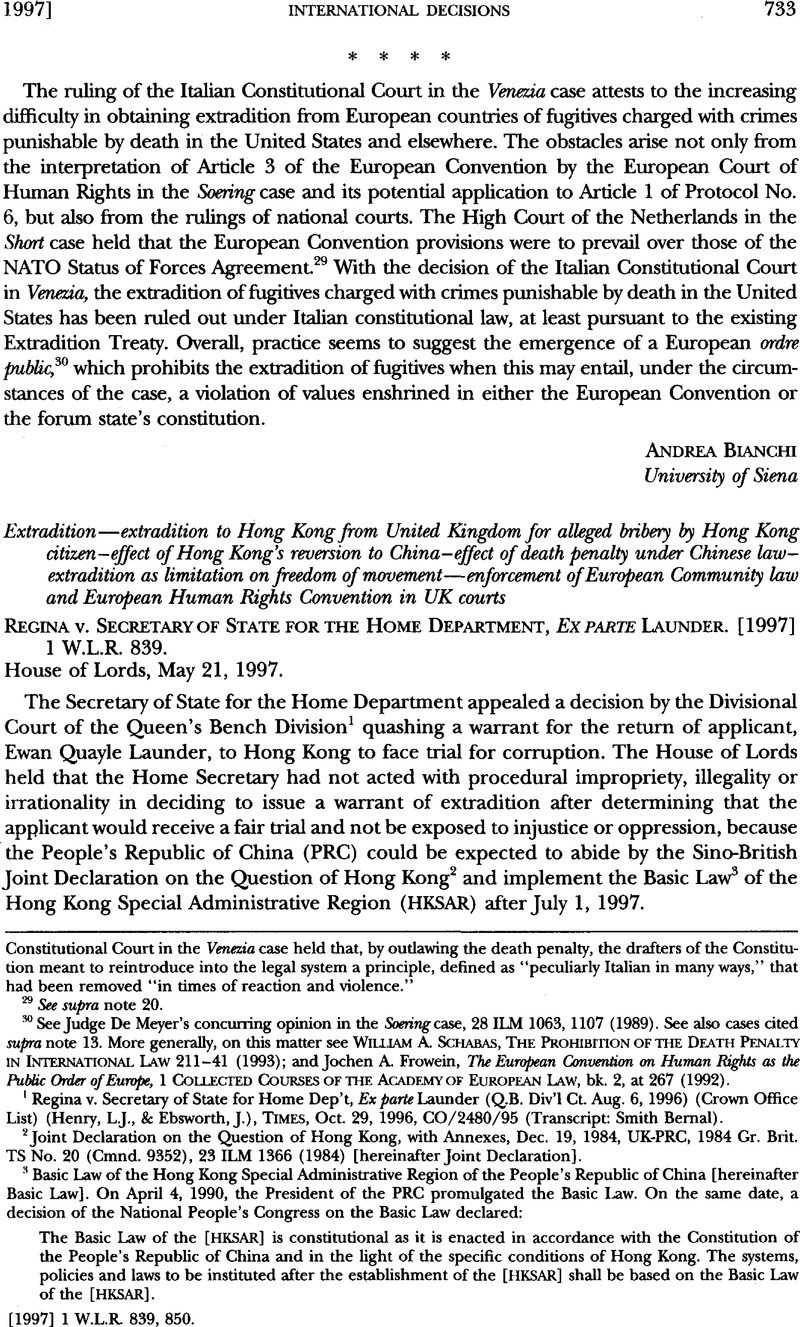No CrossRef data available.
Published online by Cambridge University Press: 27 February 2017

1 Regina v. Secretary of State for Home Dep’t, Ex parte Launder (Q.B. Div’l Ct. Aug. 6, 1996) (Crown Office List) (Henry, L.J., & Ebsworth, J.), Times, Oct. 29, 1996, CO/2480/95 (Transcript: Smith Bemal).
2 Joint Declaration on the Question of Hong Kong, with Annexes, Dec. 19, 1984, UK-PRC, 1984 Gr. Brit. TS No. 20 (Cmnd. 9352), 23 ILM 1366 (1984) [hereinafter Joint Declaration].
3 Basic Law of the Hong Kong Special Administrative Region of the People’s Republic of China [hereinafter Basic Law]. On April 4, 1990, the President of the PRC promulgated the Basic Law. On the same date, a decision of the National People’s Congress on the Basic Law declared:
The Basic Law of the [HKSAR] is constitutional as it is enacted in accordance with the Constitution of the People’s Republic of China and in the light of die specific conditions of Hong Kong. The systems, policies and laws to be instituted after the establishment of the [HKSAR] shall be based on the Basic Law of the [HKSAR].
[1997] 1 W.L.R. 839, 850.
4 Section 11(3) provides:
Without prejudice to any jurisdiction of the High Court apart from this section, the court shall order the applicant’s discharge if it appears to the court in relation to the offence, or each of the offences, in respect of which the applicant’s return is sought, that:
(a) by reason of the trivial nature of the offence; or
(b) by reason of the passage of time since he is alleged to have committed it or to have become unlawfully at large, as the case may be; or
(c) because the accusation against him is not made in good faith in the interests of justice, it would, having regard to all the circumstances, be unjust or oppressive to return him.
In Regina v. Governor of Pentonville Prison, Ex parte Sinclair, [1991] 2 App. Cas. 64, 80-81, Lord Ackner observed:
By this section a radical alteration has been made by giving to the High Court, in part at least, the same kind of discretion, as to whether or not to discharge an applicant, as the Secretary of State has in deciding whether or not to order a fugitive criminal to be returned to a requesting state.
5 In determining the rationality of the exercise of the Secretary’s discretion, the court noted that it was evaluating decisions in which there was a substantial policy content. Thus, the court advised that it needed to exercise great caution in holding a decision to be irrational.
6 The court determined that the Secretary was not entitled simply to assume that a foreign government would adhere to its treaty obligations. The court quoted Lord Bridge of Harwich in Regina v. Secretary of State for Home Dep’t, Ex parte Bugdaycay, 1987 App. Cas. 514, 537, [1987] 1 All E.R. 940, for the proposition that the court had an obligation to examine closely the Secretary’s decision-making process: “In my opinion where the result of a flawed decision may imperil life or liberty a special responsibility lies on the court in the examination of the decision-making process.”
7 [1997] 1 W.L.R. at 857.
8 Joint Declaration, supra note 2, Annex I, pt. II.
9 Id., part XIII provides:
The [HKSAR] Government shall protect the rights and freedoms of inhabitants and other persons in the [HKSAR] according to law. . . .
Every person shall have the right to confidential legal advice, access to the courts, representation in die courts by lawyers of his choice, and to obtain judicial remedies. Every person shall have the right to challenge the actions of the executive in die courts.
10 Id., pt. III.
11 Id.
12 Basic Law, supra note 3, chapter IV, section 4, Article 85 provides: “The courts of the [HKSAR] shall exercise judicial power independently, free from any interference. Members of the judiciary shall be immune from legal action in the performance of their judicial functions.” Article 86 of that section provides that die “principle of trial by jury previously practised in Hong Kong shall be maintained.”
13 [1997] 1 W.L.R. at 857.
14 Id.
15 Id.
16 Id.
17 The court thereby rejected the reasoning of the divisional court that Convention law could not be considered, as the Convention had not been incorporated into UK law.
18 110 F.3d 103 (1st Cir. 1997), summarized in 91 AJIL 537 (1997).
19 See Queen’s Speech on the Opening of Parliament, May 14, 1997 <http://www.coi.gov.uk/coi/qs_97/speech.html> (“A bill will be introduced to incorporate into United Kingdom law the main provisions of the European Convention on Human Rights.”).